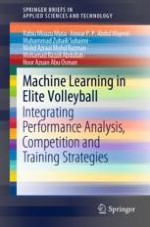2021 | Buch
Machine Learning in Elite Volleyball
Integrating Performance Analysis, Competition and Training Strategies
verfasst von: Dr. Rabiu Muazu Musa, Prof. Dr. Anwar P. P. Abdul Majeed, Muhammad Zuhaili Suhaimi, Mohd Azraai Mohd Razman, Prof. Dr. Mohamad Razali Abdullah, Prof. Dr. Noor Azuan Abu Osman
Verlag: Springer Singapore
Buchreihe : SpringerBriefs in Applied Sciences and Technology
